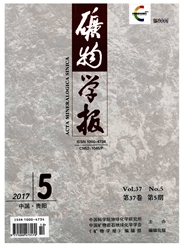

 中文摘要:
中文摘要:
徐家山锑矿床位于湖北省通山县境内,矿体赋存于上震旦统灯影组和陡山沱组地层中。对采自该矿的辉锑矿进行了系统的铅同位素测定。结果表明,在徐家山矿区范围内存在两组明显不同的铅同位素组成:A组^206Pb/^204Pb为18.874~19.288,^207Pb/^204Pb为15.708~15.805,^208Pb/。^204Pb为38.642~39.001,为高放射性成因铅;B组以低放射性成因铅为特征,其同位素组成^206Pb/^204Pb为17.882~18.171,^207Pb/^204Pb为15.555~15.686,^208Pb/^204Pb为37.950~38.340。对应地,相关参数也明显不同,如单阶段模式年龄,A组为负值或极小的正值,而B组为636~392Ma。铅同位素组成与某些相关参数(△γ与△β、V1与V2)之间呈明显线性正相关关系。根据铅构造模式和矿石铅同位素的△γ-△β成因分类图解等综合分析,A组辉锑矿的铅主要来源于赋矿围岩——震旦系海相碳酸盐岩,B组主要来源于赋矿围岩的下伏基底碎屑岩——中元古界冷家溪群浅变质岩系。研究结果不支持前人沉积-改造成因的观点,成矿物质是多来源的,部分成矿物质来自基底地层。
 英文摘要:
英文摘要:
The Xujiashan antimony deposit is located in Tongshan County, Hubei Province, and its orebodies occurred in marine carbonates of the Upper Sinian Doushantuo and Dengying formations. Lead isotopic composition of stibnite from this deposit has been systematically analyzed in this paper. It is shown that isotope ratios in ore lead can be classified as two groups (Group A and Group B), Group A is characterized by higher radiogenic lead with ^206Pb/^204pb = 18. 874 to 19. 288, ^207Pb/^204Pb = 15. 708 to 15. 805, and ^208Pb/^204pb = 38. 642 to 39. 001. Whereas Group B shows lower lead isotope ratios (^206Pb/^204pb = 17. 882 to 18. 171, ^207Pb/^204pb = 15.555 to 15. 686, and ^208Pb/^204pb = 37. 950 to 38. 340). And their relevant parameters are also distinct, for example, the single-stage model ages of Group A are almost negative or very small positive values, while those of Group B range from 636 to 392 Ma, with an average of 495 ± 65 Ma. In addition, there are obviously positive linear correlations among lead isotope compositions and some other related parameters (△γ vs △β ,△ V1 vs V2). Based on diagrams of lead tectonic pattern and △γ-△β genetic classification for ores, the lead of Group A stibnite was mainly derived from the host rocks -- Sinian marine carbonates, and the lead of Group B one was predominately derived from the underly- ing basement -- low-grade metamorphic clastic rocks of the Mesoproterozoic Lengjiaxi Group. Furthermore, it is concluded that the Xujiashan antimony deposit is not of sedimentary-reworked origin as previously considered, its ore- forming materials were partly derived from the basement rocks.
 同期刊论文项目
同期刊论文项目
 同项目期刊论文
同项目期刊论文
 A precise U-Pb age on cassiterite from the Xianghualing tin-polymetallic deposit ( Hunan , South Chi
A precise U-Pb age on cassiterite from the Xianghualing tin-polymetallic deposit ( Hunan , South Chi Characteristics of rare earth elements (REE), strontium and neodymium of hydrothermal fluorites from
Characteristics of rare earth elements (REE), strontium and neodymium of hydrothermal fluorites from 期刊信息
期刊信息
